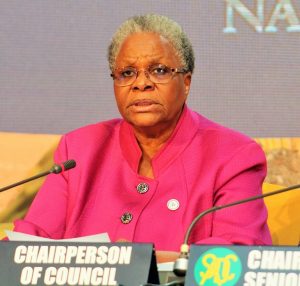SADC Progressed In Economic Integration – Nandi-Ndaitwah
 The outgoing chairperson of the Council of Ministers of the Southern African Development Community (Sadc), Netumbo Nandi-Ndaitwah, says the regional bloc has made some progress in economic integration, but that more needs to be done on industrial development initiatives.
The outgoing chairperson of the Council of Ministers of the Southern African Development Community (Sadc), Netumbo Nandi-Ndaitwah, says the regional bloc has made some progress in economic integration, but that more needs to be done on industrial development initiatives.
Nandi-Ndaitwah said this during the regional bloc meeting while handing over the Sadc Council of Ministers chair to incoming chair, Tanzania Minister of Foreign Affairs and East African Cooperation, Palamagamba Kabudi, in Dar es Salaam, Tanzania on Tuesday.
The Sadc Council of Ministers meeting started on Tuesday and ended Wednesday. The meeting took place ahead of the 39th SADC Ordinary Summit of Heads of State and Government on Saturday and Sunday.
The meeting discussed key issues in the region, such as the state of Sadc’s finances and reports from the various committees.
Nandi-Ndaitwah, who is Namibia’s Minister of International Relations and Cooperation, said the region is in the process of realigning its strategic plans and renewing its priorities to ensure that they are relevant to the challenges faced in the region and to align its programmes to the regional bloc’s continental aspirations.
“That is to say, as we prepare for the next phase of renewal for our Regional Indicative Strategic Development Plan (RISDP) and SIPO (2020-2030), we also need to realign the Sadc regional vision 2050 to speak to the continental developmental Agenda 2063,” said Nandi-Ndaitwah, who is also the Namibian deputy prime minister.
She said industrialisation remains at the core of the integration agenda of Sadc and central to the diversification of regional economic growth.
Therefore, she said, there is a need to prioritise trade facilitation with regard to infrastructure such as roads, rail, harbours, among others.
“We also have to find ways of reducing transport costs and transit delays,” she added.
Nandi-Ndaitwah says all that is necessary must be done to prepare the region to benefit from the African Continental Free Trade Area (AfCFTA).
In this regard, Nandi-Ndaitwah informed the meeting that on August 2, Namibia inaugurated the new container terminal at Walvis Bay port, which has a capacity to handle 750 000 twenty-foot containers.
The inauguration of the container terminal, Nandi-Ndaitwah said, aims for the port to become the preferred western coast facility for southern and central African logistics operations.
She said the port would facilitate access to international markets, by granting landlocked countries access to the Atlantic Ocean and thus creating easier and faster transit between Africa, Europe, Asia and the Americas.
Furthermore, Nandi-Ndaitwah said Sadc was born out of solidarity that has in turn informed the holding and the outcome of the Sadc solidarity conference with the people of Western Sahara.
“It is our responsibility to ensure the full implementation of that conference declaration, as our commitment to walk with the people of Western Sahara to self-determination,” she stressed.
Also, she said Sadc has kept to its decision to have gender equality and women empowerment as a permanent item in the regional bloc’s agenda.
She said the year 2020 will mark the 25th commemoration of the declaration adopted at the Fourth World Conference on Women in 1995 in Beijing, China, and the 20th anniversary of UN Security Council Resolution 1325/2000.
“As a region, we have made great strides in this area. We have a story to tell and a contribution to make. We have to put on record that if there is a UN document where Sadc has played a central role, it is the Beijing Platform for Action and its declaration, where personally I served as Africa chief negotiator,” she said.
Nandi-Ndaitwah said that together with the international community, Sadc has to take part in the activities for the year and must bring out the significant contribution the region has made in the advancement of gender equality and women empowerment, particularly in decision-making and economic empowerment as well as peacekeeping.
She said this would ensure that the region’s achievements are reflected in the simultaneous national, regional and global review processes.
Nandi-Ndaitwah concluded by assuring incoming Sadc Council of Ministers chair Kabudi of Namibia’s readiness to work with him as he further steers Sadc to greater heights.
Author: Kuzeeko Tjitemisa























